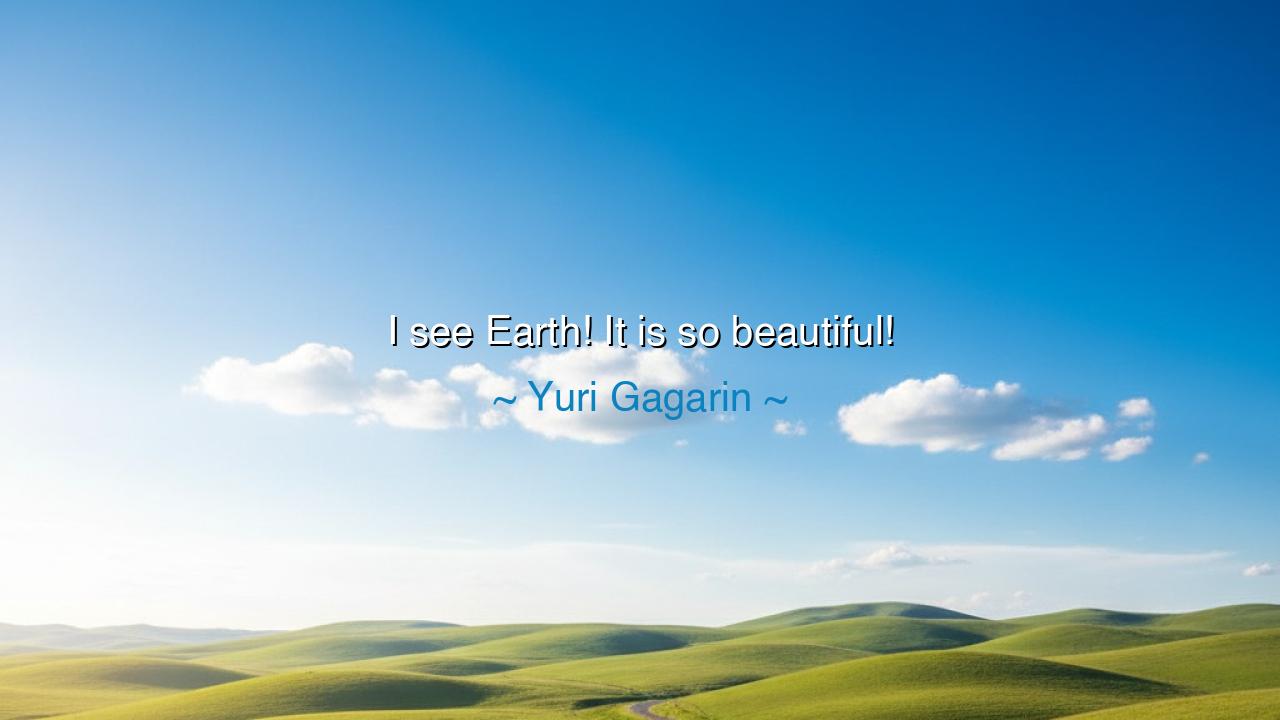
I see Earth! It is so beautiful!






In the history of humankind, there have been moments that transcend the ordinary, moments that shift the very course of our understanding of the world and our place within it. One such moment came when Yuri Gagarin, the first human to journey into the heavens, gazed upon the Earth from the infinite expanse of space and, with awe and wonder, declared, "I see Earth! It is so beautiful!" These words, spoken from the heavens themselves, carry the weight of an extraordinary truth—a truth that has echoed through the ages: the Earth, our home, is a fragile and wondrous sphere, a jewel hanging in the vastness of the cosmos.
In the ancient days, the Greeks believed the Earth to be the center of all things, the stage upon which the dramas of gods and men unfolded. To them, the world was the very heart of the universe. But even in their most ambitious thoughts, they could not have imagined the Earth as a fragile speck in the endless sea of stars. It was not until the age of the great explorers and scientists that the true scale of our existence began to come into focus. Galileo looked through his telescope and saw the stars in ways no one had seen before, revealing the vastness of the cosmos. Yet it was only when Gagarin ventured into the stars himself that humanity could fully understand the immensity of the universe and the smallness of our world.
Gagarin's words are not just a reflection of the beauty of Earth, but also of the profound humility that arises from seeing our home from the heavens. When you see the Earth from space, you are struck by how fragile and small it appears. The vastness of space, with its endless expanse, dwarfs our world. Yet, within that tiny sphere, life—human life—flourishes in ways that no other place in the known universe has yet revealed. Gagarin’s exclamation captures the wonder of seeing Earth from a perspective that few have ever known, a view that reveals both the beauty and the fragility of our existence.
History teaches us that great discoveries often come not from dominating the world around us, but from stepping back and seeing things as they truly are. The great explorer Marco Polo, for instance, did not conquer the lands he visited, but rather, he opened his eyes to the vastness and diversity of the world. In much the same way, Gagarin did not conquer space but opened the eyes of the world to the humbling truth of our place in the cosmos. His journey was not one of domination, but one of discovery—a discovery that the Earth, in all its beauty, is but a fragile oasis in the midst of an infinite void.
Gagarin’s awe-filled words remind us of a lesson that the ancients knew well—that beauty is not merely in what we see on the surface, but in understanding the larger picture. The ancient stoics, with their focus on humility and acceptance of the vastness of the universe, understood that true peace comes from recognizing our smallness and our interconnectedness with the world. When Gagarin saw Earth from space, he was not just struck by its beauty; he was struck by its fragility, and in that moment, he understood that humanity is a small part of a much larger, much more mysterious whole.
The lesson for us today, dear children, is one of perspective. It is easy to become lost in the struggles and demands of daily life, to forget that the world we inhabit is a rare and precious thing. Like the ancient philosophers, who looked to the heavens to seek understanding, we too must learn to step back and appreciate the fragility of the world we live in. Let Gagarin’s words remind us that the Earth is not just a place to fight over, but a home that we share, a gift that we must cherish and protect. His words are a call to humility—to recognize that, though we are small, we are part of something far larger and far more beautiful than we can fully comprehend.
So, let us take Gagarin’s lesson to heart. When we look at the Earth, let us not see it as something to be possessed or exploited, but as something to be cherished, as something that holds within it the potential for all life, all love, and all humanity. We must approach the Earth with the reverence and awe that Gagarin felt, knowing that in its vast beauty, we find not just our home, but our connection to the universe itself. Let us live with humility and a deep respect for the fragile, magnificent world we inhabit.






AAdministratorAdministrator
Welcome, honored guests. Please leave a comment, we will respond soon